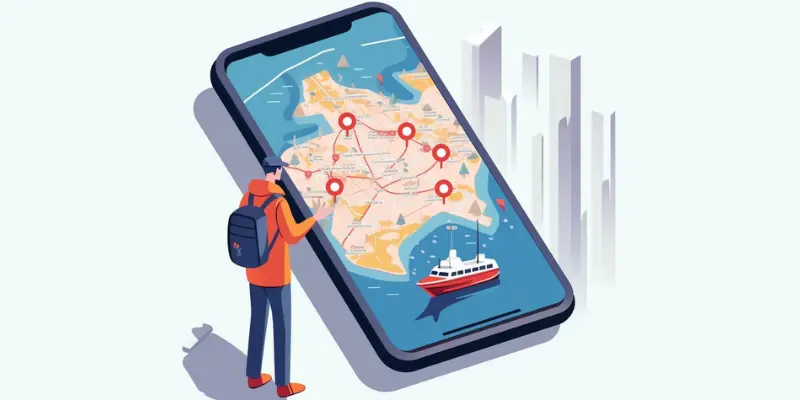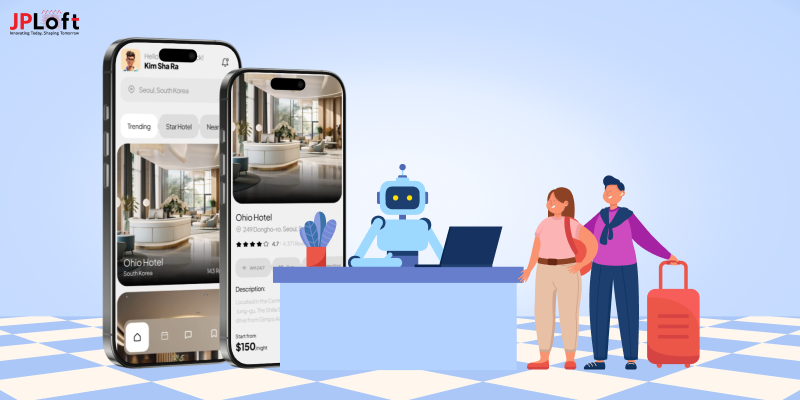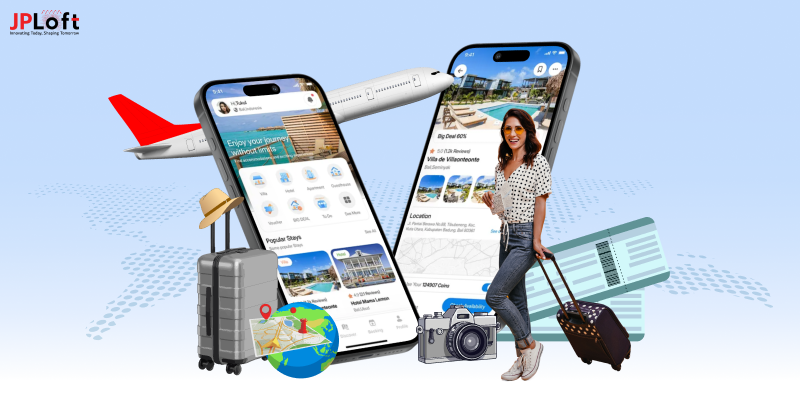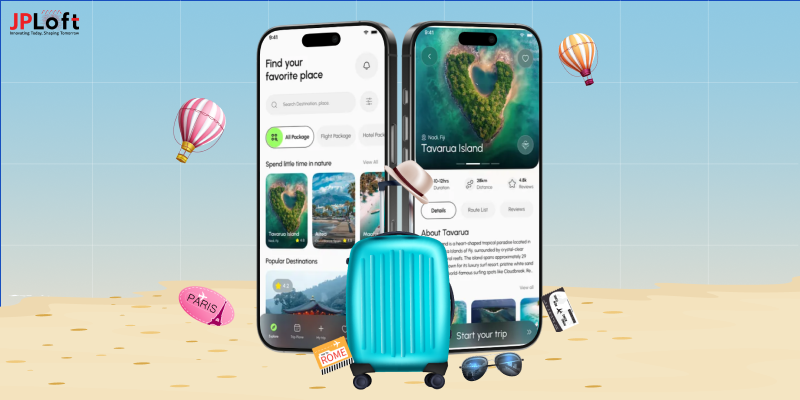Travel planning can be both thrilling and exhausting due to all the options and details to consider. While people enjoy discovering new destinations, planning can often become time-consuming. This explains why AI-powered travel planner apps have seen such widespread adoption, simplifying the whole experience.
Travel Planning App Development serves as a virtual travel assistant, from planning your itinerary and booking flights and hotels to accommodating specific preferences or past decisions of travelers traveling together. AI technology makes these travel applications stand out. Why? They're capable of processing vast volumes of data to offer recommendations that best match user preferences for places, activities, or accommodations. AI can make these applications even more flexible and adaptable. For instance, adapting instantly in response to weather reports or unexpected delays and providing up-to-the-minute travel details regarding every aspect.
This blog post will explore how AI-powered planning apps have transformed travel planning. We will examine their advantages as an AI trip-planning solution and features to consider when selecting suitable AI trip-planning apps.
Let's get started.
What Is An AI-Driven Trip Planning App?
The AI-driven app for planning trips utilizes artificial intelligence to help improve the method of arranging and planning travel plans. It uses AI algorithms to study user preferences, previous facts, and real-time data, including weather conditions, local events, and other pertinent factors to recommend customized travel plans.
The best AI travel planners can suggest destinations, activities, hotels, lodgings, restaurants, and activities based on user feedback and their preferences. They strive to speed up the process of planning trips, offer specific recommendations, and improve travel schedules. It boosts the overall experience of traveling by responding to feedback from users in real-time and their preferences.
The Role Of AI In Travel Apps
Artificial intelligence is an exciting area that combines computer science with large databases. The synergy between these two fields helps address a myriad of pertinent questions. This is in large part because of deep and machine learning. These fields provide the technology and methods for creating self-learning systems that make predictions and classify.
AI employs a variety of methods and techniques, that's the reason why we have decided to make a list of the most critical areas:
Machine Learning
It's a crucial element of modern technology that allows computers to acquire knowledge without being taught, learning, or reading data analysis for real-world situations. Our team, for instance, uses deep math expertise and machine-readable languages to create full-blown Machine Learning systems.
Neural Network
AI integrates cognitive science and technology to perform more tasks than humans can. Neural networks simulate the functions that the brain performs. Additionally, they employ various methods that reveal the essential connections between different datasets. This network relies on techniques like regression analysis, for instance, to complete tasks.
Expert Systems
The solutions are based on human experts. This is achieved using a knowledge database. The system then implements reasoning rules for the user's queries. When using Google, these algorithms suggest spelling and grammar errors, such as the Google index.
Fuzzy Logic
In contrast to fixed, precise reasoning, this form of logic based on mathematics interprets approximate data. Fuzzy logic processes and evaluates data from various sources to make judgments.
Natural Language Processing (NLP)
Utilizing NLP algorithms, machines can read and interpret written information as humans can. NLP is a method for finding, analyzing, and understanding text information. The NLP library aids computers in finding relevant data from texts.
Knowing how AI has changed how we explore our world is essential if you are a frequent traveler. With AI chatbots and virtual travel agents, you can book and plan your travels with a few mouse clicks. It is possible to increase our security by receiving real-time updates on weather conditions and alerts about security. The positive impact of AI on travel is evident. Technology has made the travel experience more effective, fun, and secure.
Benefits Of Developing AI-Driven Travel Planning App
There are numerous benefits to creating an AI-driven travel planning app that is worth investing in. A few include:
Optimized Itinerary Planning
The time you spend is valuable when traveling; each top AI travel planner app recognizes this. By analyzing aspects such as your budget, schedule, and personal preferences, AI Travel App Development Solutions will create customized itineraries so that you can get the most out of each minute. Whether planning a quick trip for a weekend or an entire month, using an AI application can help make your travel more enjoyable.
Real-Time Insights For Informed Decisions
Navigating fluctuating costs and last-minute adjustments is a significant and stressful element of travel planning. AI can provide instant updates about flight prices, hotel openings, local happenings, and even weather forecasts. This abundance of information allows users to make informed choices and take advantage of the most lucrative opportunities.
Personalized Recommendations
Imagine a device that can learn about your travel preferences, past travels, or even your favorite pastimes. The AI-powered trip planning application can analyze these data points to provide specific recommendations that perfectly match your preferences.
Improved Decision-Making
AI offers valuable insight through data analysis, assisting travel businesses in making better pricing, marketing, and customer engagement choices. Access to real-time information lets companies respond rapidly to changing market conditions and consumer demands.
Competitive Advantage
Implementing AI technology can give travel businesses an advantage in competition by providing cutting-edge features and a better customer experience. Being ahead of the technological curve will ensure a competitive advantage and attract tech-savvy travelers.
Cost Optimization
The ability to save money is an additional benefit of AI-driven apps for planning trips. The ability to save money when traveling is always beneficial, as AI can predict price patterns. By analyzing data and market trends, AI software applications for planning trips can suggest the ideal dates to reserve accommodation, flights, and other activities to get the most significant worth for your money.
Must-Have Features Of AI Trip Planner Apps
The most effective AI trip planners offer many features that help travelers plan their travels efficiently and with maximum personalization. The apps employ advanced machine-learning algorithms to study different factors. Here are a few unique features that AI-driven travel apps have to offer. Planning App
Itinerary Planning
AI Travel Itinerary Apps Development simplifies designing an itinerary based on the user's inputs and available information. The AI component of these applications considers variables such as time of travel, distances between destinations, operating hours of the places of interest, and even transport alternatives. The travel apps are a step ahead in allowing travelers to view their travel plans on maps, easily alter their schedule of activities, and then export the plans seamlessly for use on platforms such as Google Maps for navigation.
Personalization
Top AI travel planners can personalize each aspect of your schedule to suit your preferences and desires. Applications utilize sophisticated algorithms to analyze user preferences and give personalized advice to make travel more enjoyable for all users.
Expense Tracking
The most advanced AI trip planners include tools for tracking expenses and managing budgets efficiently. They also include tools to convert currencies, categorize expenses, and split bills across group travel, helping people stay within their budgets and avoid unexpected financial costs during their journeys.
Alerts And Updates In Real-Time
Real-time data feeds enable your application to be updated regarding current events, such as flight delays, weather conditions, or local happenings. This will ensure travelers are constantly updated and can quickly change their plans—AI chatbot development services.
Also Read: Travel App Development: A Complete Guide
Collaborative Planning
Collaboration is another intriguing characteristic of any AI travel application. Many AI trip planners facilitate live collaboration between travel partners. Like collaborative tools such as Google Docs, these apps permit group members to participate in planning an itinerary, share information about their travel plans, and even synchronize their calendars. It ensures a smooth and pleasurable trip for everyone.
IoT Integration For Smart Travel
Integration with IoT devices provides travelers with the most hassle-free travel experience possible. The IoT-enabled application can check on the hotel room or flight using the smartwatch. After checking in to your hotel settings, the room is reset to the setting desired by the client.
Sustainable Travel Recommendations
Sustainability can benefit travelers by lessening environmental impact and helping preserve culture. Many options are available to users, such as eco-friendly hotels, Carbon offset flights, and local recommendations for sustainable trips.
Reservation Management
Most travel planning apps powered by AI feature a feature to simplify managing the booking process by automatically taking the booking information from email or accounts connected to them. This function of the AI travel app removes manually entering flight reservations, hotel reservations, and rental cars, reducing errors and saving time.
Offline Access
To understand the difficulties connectedness can cause while traveling, such apps typically provide offline access to trip plans. Travelers can download itineraries, maps, and vital travel info on their mobile devices, providing accessibility even in places without connectivity to the internet.
Multilingual Support
A few AI travel agents support multiple languages to cater to a worldwide public. This allows for seamless communications and personalized travel suggestions across various languages, increasing accessibility for travelers worldwide.
Guide To Build An AI-Driven Travel Planning App
Developing a highly successful AI-driven travel planning application requires meticulous preparation, understanding your customers, and utilizing the most advanced technology.
Outline Your Objectives
Begin by defining the objectives you intend the AI-powered Tour & Travel App Development to accomplish. Determine the particular issues or problems it can resolve for travelers. Define the essential elements and functions you plan to incorporate, including planning your itinerary, personal suggestions, and real-time updates regarding travel alternatives. With clear goals, you can be the basis for every part of your app's creation.
Conduct Market Research
A thorough market analysis is an essential element of a great app. Do a comprehensive market study to determine the requirements and desires of your targeted customer group. Examine existing travel apps to discover areas of opportunity or regions where your app can be distinct.
You can conduct surveys, interviews, and focus groups to learn what users think. The insights generated will help you develop an app that meets travelers' requirements and differentiates itself from other apps.
Choose The Right AI Technologies
Selecting the best AI technologies is vital because it could determine the success or failure of your app. Pick AI technology that is compatible with the goals of your application and the needs of users. You can use machine learning algorithms that allow you to customize suggestions based on the preferences of users and behavior.
Learn about the possibilities of natural technology for processing languages (NLP) and developing chatbots to assist customers in booking reservations or other travel advice. Explore various AI platforms and applications to determine the most effective solution that will improve the performance as well as the user experience of your application.
Gather And Prepare Data
When you have selected the best AI technology for your AI-powered travel application, gather relevant data to power the AI models and enhance your app's capability. This can include user information (like preference and previous bookings) as well as travel trends, price information from airlines and hotels, and historical patterns in the behavior of travelers. Ensure the data you collect is correct and high-quality through cleaning and processing before integrating it into your AI algorithm.
Develop Core Features
This is one of the most critical aspects of the AI travel planner app design procedure. Concentrate on creating essential features that utilize AI to offer value to users. Design the main aspects of your travel application by focusing on AI-driven features. These could be personalized recommendations, Chatbot support, instant updates, or fraud detection. Ensure users have a smooth experience by seamlessly integrating these features within the user interface.
Test And Optimize
Test the travel application powered by AI to find and fix issues and bugs before it goes live. Perform usability tests with actual customers to collect feedback about the application's features, functionality, interface, and overall user satisfaction. Utilize this information to implement needed improvements and optimize to increase performance, speed of response, and user satisfaction.
Ensure Data Privacy And Security
Establish strong security and data privacy practices to safeguard user data and establish confidence. Adhere to the appropriate laws governing data protection, including GDPR and CCPA, and employ encryption to safeguard important data such as financial and personal data. Be clear about your privacy policies to customers to ensure your data's security.
Launch And Market Your App
When your AI-powered travel app is tested thoroughly and optimized by Travel App Development Company, you can launch it through popular distribution platforms. Create a comprehensive marketing plan to market your app and draw customers. You can also use social media platforms, collaborate with influencers in the field of travel, and run targeted marketing campaigns that can reach your targeted people efficiently.
Monitor And Improve
Once the app is launched, monitor its performance closely with analysis tools. To do this, you'll need to monitor engagement metrics, such as apps downloaded, active users, and interaction within the app, to assess its success.
Studying users' feedback and behavior is crucial to pinpoint improvement areas and develop new features. Constantly update your app by making improvements that keep the users entertained and happy with the ever-changing travel industry.
Cost To Develop An AI-Powered Travel Planning App
Before you begin the development of an AI travel planning application, establishing your budget and figuring out the costs of creating an AI-driven application for a travel planner is crucial. If you're a start-up looking to simplify your life or are looking for an enterprise-level application, knowing costs can help guide the process from idea to implementation.
AI Trip Planner App features
The range of your travel application's AI capabilities defines its costs. The essential functions, such as planning and tracking your itinerary, can be financed, usually priced between $15,000 and $35,000. But if you want personalized real-time service, AR/VR integration, or machine learning-driven trip design, expect to spend significantly more, anywhere between $50,000-$200,000 or greater. The advanced features in the AI travel planner app promise increased user satisfaction. Still, they are priced in a way that is proportional to the cost.
Design And User Experience
Aesthetics matter. Employing skilled designers will ensure that your app for travel not only runs smoothly but also draws customers visually. The investment to create the most user-friendly, polished interface is vital to attracting and keeping users in an increasingly competitive marketplace.
Development Team And Location
The decision to in-house mobile application development or outsourcing it affects both operational costs and the cost of development. Outsourcing work to areas with lower labor costs could lower initial costs. Still, it must be managed carefully to guarantee quality and seamless integration with third-party applications. In contrast, in-house staff provides control and collaboration but may cost more.
Ongoing Maintenance And Updates
Launching your AI-driven travel apps is only the beginning. Regular maintenance and upgrades ensure that AI models run smoothly and that your application runs efficiently over time. Setting aside funds for ongoing support will ensure that your investment continues to provide value and is at the forefront of a rapidly changing marketplace.
Making an AI-powered app for planning trips requires strategic planning and an eye on the financial side. Every feature option, from the essential functions to advanced AI capabilities, affects the development cost. When you make suitable investments in the design process, team development know-how, and continual maintenance, you will be able to build an application that not only fulfills the expectations of its users but also makes a mark on the crowded market for technological advancements in travel.
Use Cases Of AI-driven Apps For Tourism And Travel
From streamlining procedures to improving the customer experience, AI apps are changing our way of exploring our world. We'll explore how Travel Software Development Services using AI agents is changing many areas of the travel and tourism business:
Booking a Flight
Booking flights can be difficult, especially given the variety of choices and fluctuating costs. AI agents study previous data, trends in demand, and market conditions to forecast optimal booking times. The intelligent system ensures travelers get the most value for money and reduces anxiety.
Hotel Reservation
AI travel experts consider their clients' preferences, budgets, and preferences for location to suggest a customized hotel. Whether it's a boutique property or a resort with a luxurious feel, AI will help travelers locate their perfect home far from home.
Planning Your Trip
Creating a well-planned travel itinerary requires balancing sightseeing, transport, and time limitations. AI-powered agents design customized itinerary plans based on the individual's interests and preferences. It suggests top attractions, restaurants, places to eat, or even the most efficient travel methods. Tourists can discover more and feel less stress.
Real-Time Translation Of Languages
Traveling overseas is now effortless with the live translation of languages in real time. AI-powered agents convert written or spoken words and break down the language barrier. Visitors can communicate easily if you negotiate the price in a local store or seek directions.
Predicting The Price Of Flights
AI algorithms analyze historical patterns of seasonality, data from previous years, and external influences (such as holidays and events) to anticipate the future price of flights. These resources help travelers make informed decisions that help prevent price surges at the last moment.
Personalized Suggestions
AI can recognize individual preferences, ranging from food tastes to activity preferences. By analyzing the user's behavior and feedback, AI agents recommend personalized experiences—whether it's an obscure or unique restaurant or an idyllic walking trail.
Customer Service
Autonomous AI agents answer questions, provide real-time assistance, and respond to common travel questions. AI guarantees a prompt and precise response if you have questions about booking changes, flight delays, or missing luggage.
Travel Packages
AI creates complete package deals for travel, combining lodging, flights, and other activities. The packages are designed to meet various preferences, including those interested in adventure, culture, and relaxation. Travelers can pick hassle-free options that are tailored to their needs.
Travel Safety
The safety of travelers is paramount. AI can monitor weather conditions, political stability, and health warnings, warning travelers of potential dangers. Furthermore, AI-powered security systems increase security at airports and baggage inspections, ensuring travelers have an enjoyable and safe journey.
AI-powered agents are revolutionizing travel plans and shaping the future of the whole tourism sector. As technology improves, we anticipate even more innovative ways to change how we travel.
Revenue Model Of AI Drivel Travel Planner Apps
Creating an AI-driven travel planning application is thrilling, but knowing how to make money with your app is essential to succeed. This section will provide a thorough overview of the various monetization strategies to consider.
Subscription Model
A subscription-based model is a different method of generating money through the AI travel app. In this model, customers are regularly charged a fee, be it monthly, annually, or every quarter, to access premium features.
A subscription-based model provides an ongoing revenue stream and increases customer satisfaction. For example, you can offer personalized travel plans with 24/7 support, travel insurance integration, special experiences for VIP customers, and early access to the latest options. You can maintain an existing subscriber base by constantly improving your premium offerings.
Freemium Model
The freemium model can be an excellent starting point for your application. By offering basic features for the price of a single dollar, you could attract a large number of users. The free services could comprise making basic itineraries, using maps, or getting basic suggestions.
If users become hooked, you could encourage them to purchase a premium version to gain more options. The premium features could include the most detailed trip planning and offline access, special offers on travel, live updates, and a completely ad-free user experience. This is a great model as it enables users to test your application without financial commitment before they can choose to purchase additional options if they see value within your services.
In-App Purchases
In-app purchases can be a great income stream earned through your AI-driven travel application. The method lets users purchase additional features or services from within the application—for instance, customized travel guides, unique destinations, travel items, and virtual concierge services. In-app purchases can be a versatile method to make money from different aspects of your application, allowing customers to enhance their experience depending on their preferences.
Advertising
Advertising is a significant source of income, particularly for apps with an enormous number of users. Advertisements can be displayed in banners, sponsored content, and videos. Consider using targeted ads based on user preferences and travel histories to make ads more effective and less intrusive.
Advertisements for sponsored listings of restaurants, hotels, and attractions can bring revenues. Native advertising, which means ads seamlessly integrate into the user experience of apps, could increase user engagement while not affecting their interaction.
Affiliate Marketing And Partnerships
Affiliate marketing is the process of partnering with travel-related companies and earning a commission on bookings or referrals through your travel application. The app can work with hotels, airlines, car rental companies, travel insurance providers, and tour operators.
If users purchase a product via your links to refer users, you earn a portion of the amount they spend. This not only earns you money but also increases the functionality of your travel app by providing customers with easy booking choices.
Commission On Bookings
A different monetization strategy for AI-driven travel apps includes booking service integration to book flights, accommodation rental cars, and other actions inside your application. In the role of an intermediary, you could receive commissions for each reservation that is made via your application. Customers can make reservations directly through the app and earn a percentage of each booking.
Alternatively, you could sell white-label products from Third-party vendors and earn a fee for every booking. The model leverages your application's capabilities as a complete travel planner, making it an all-in-one destination for all your travel needs. Implementing these monetization strategies will allow you to generate profits from your AI-driven trip-planning app. Each approach has distinct advantages, and when combined, these strategies will result in an unbeatable and varied income stream.
Conclusion
Developing an AI-powered travel planning application can be a game changer for the travel industry. With the help of AI technologies, travel businesses can offer personalized customer experiences, improve customer satisfaction, and increase their competitive advantage. However, integrating AI in a travel application is not without the same issues, including data privacy concerns, high implementation costs, and technical knowledge requirements.
Following the step-by-step method discussed in this blog and prioritizing users' needs and preferences, companies in the travel industry can design and implement AI-powered travel apps that can transform how people travel. Take advantage of AI's potential and embark on the journey of creating unique travel applications that respond to the ever-changing needs of today's travelers.













Share this blog